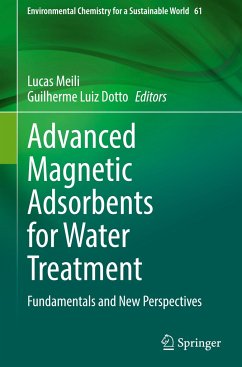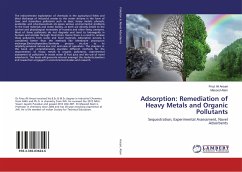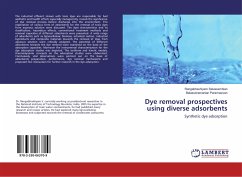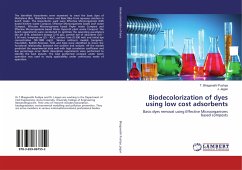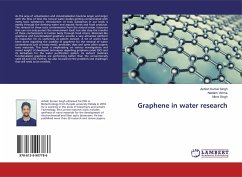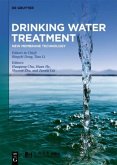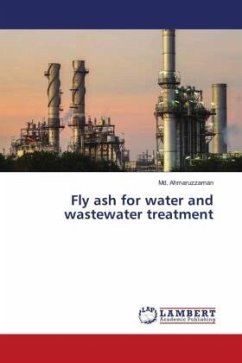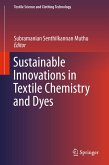Advanced Magnetic Adsorbents for Water Treatment
Fundamentals and New Perspectives
Herausgegeben:Meili, Lucas; Dotto, Guilherme Luiz
Advanced Magnetic Adsorbents for Water Treatment
Fundamentals and New Perspectives
Herausgegeben:Meili, Lucas; Dotto, Guilherme Luiz
- Gebundenes Buch
- Merkliste
- Auf die Merkliste
- Bewerten Bewerten
- Teilen
- Produkt teilen
- Produkterinnerung
- Produkterinnerung
This book compiles 15 chapters about the synthesis, characterizations, and application of many kinds of magnetic adsorbents for water treatment. It is devoted to the scientific community that works with adsorption technologies for water treatment and remediation. Specifically, for professors and Ph.D. students. It is expected that this book serves as an interesting background for researchers in the field of magnetic adsorbents for water treatment.
Andere Kunden interessierten sich auch für
![Adsorption: Remediation of Heavy Metals and Organic Pollutants Adsorption: Remediation of Heavy Metals and Organic Pollutants]() Firoz Ali AnsariAdsorption: Remediation of Heavy Metals and Organic Pollutants31,99 €
Firoz Ali AnsariAdsorption: Remediation of Heavy Metals and Organic Pollutants31,99 €![Dye removal prospectives using diverse adsorbents Dye removal prospectives using diverse adsorbents]() Rangabhashiyam SelvasembianDye removal prospectives using diverse adsorbents25,99 €
Rangabhashiyam SelvasembianDye removal prospectives using diverse adsorbents25,99 €![Biodecolorization of dyes using low cost adsorbents Biodecolorization of dyes using low cost adsorbents]() T. Bhagavathi PushpaBiodecolorization of dyes using low cost adsorbents41,99 €
T. Bhagavathi PushpaBiodecolorization of dyes using low cost adsorbents41,99 €![Graphene in water research Graphene in water research]() Ashish Kumar SinghGraphene in water research27,99 €
Ashish Kumar SinghGraphene in water research27,99 €![Drinking Water Treatment Drinking Water Treatment]() Drinking Water Treatment169,95 €
Drinking Water Treatment169,95 €![Fly ash for water and wastewater treatment Fly ash for water and wastewater treatment]() Md. AhmaruzzamanFly ash for water and wastewater treatment30,99 €
Md. AhmaruzzamanFly ash for water and wastewater treatment30,99 €![Sustainable Innovations in Textile Chemistry and Dyes Sustainable Innovations in Textile Chemistry and Dyes]() Sustainable Innovations in Textile Chemistry and Dyes70,99 €
Sustainable Innovations in Textile Chemistry and Dyes70,99 €-
-
-
This book compiles 15 chapters about the synthesis, characterizations, and application of many kinds of magnetic adsorbents for water treatment. It is devoted to the scientific community that works with adsorption technologies for water treatment and remediation. Specifically, for professors and Ph.D. students. It is expected that this book serves as an interesting background for researchers in the field of magnetic adsorbents for water treatment.
Produktdetails
- Produktdetails
- Environmental Chemistry for a Sustainable World 61
- Verlag: Springer / Springer International Publishing / Springer, Berlin
- Artikelnr. des Verlages: 978-3-030-64091-0
- 1st edition 2021
- Seitenzahl: 520
- Erscheinungstermin: 30. September 2021
- Englisch
- Abmessung: 241mm x 160mm x 32mm
- Gewicht: 1034g
- ISBN-13: 9783030640910
- ISBN-10: 3030640914
- Artikelnr.: 60405128
- Herstellerkennzeichnung Die Herstellerinformationen sind derzeit nicht verfügbar.
- Environmental Chemistry for a Sustainable World 61
- Verlag: Springer / Springer International Publishing / Springer, Berlin
- Artikelnr. des Verlages: 978-3-030-64091-0
- 1st edition 2021
- Seitenzahl: 520
- Erscheinungstermin: 30. September 2021
- Englisch
- Abmessung: 241mm x 160mm x 32mm
- Gewicht: 1034g
- ISBN-13: 9783030640910
- ISBN-10: 3030640914
- Artikelnr.: 60405128
- Herstellerkennzeichnung Die Herstellerinformationen sind derzeit nicht verfügbar.
Lucas Meili, is working as Full Professor in the Center of Technology at Federal University of Alagoas (UFAL), Maceió, Alagoas, Brazil. Prof. Meili graduated in Chemical Engineering at Federal University of Rio Grande (Brazil) and obtained his Doctor degree in Chemical Engineering at Federal University of São Carlos (Brazil) in 2009. He is permanent member of Chemical Engineering post-graduation program and also of Materials post-graduation program. His areas of interest are focused in separation processes, water and wastewater treatment, and synthesis of materials. Particularly he has interest in adsorption and advanced oxidation processes. He has several international publications in Chemical Engineering, focusing in adsorption, development of adsorbents and advanced oxidation processes. Guilherme Luiz Dotto is professor in Chemical Engineering Department at Federal University of Santa Maria (UFSM). Is a permanent member of the Chemical Engineering post-graduation program and also of the Chemistry post-graduation program. Is B.Sc. in Food Engineering, M.Sc. in Food Engineering and Ph.D. in Food Engineering. His research is focused on the following areas: transport phenomena, unit operations, wastewater treatment, physicochemical treatments for wastewater and separation processes. In specific, has specialty in adsorption/biosorption of contaminants from aqueous solutions, preparation and characterization of biomaterials and nanobiomaterials, wastewater treatment, wastes management and reuse, drying of biomaterials, statistical optimization, experimental design, response surface methodology, linear and non-linear regression analysis. In these research areas, has more than 160 published articles and is reviewer of more than 100 international journals. Its H-index is 25.
Preface.- Chapter 1 Fundamentals of Adsorption.- Chapter 2 Methods of Synthesis of Magnetic Adsorbents.- Chapter 3 Magnetic Biosorbents and their Application in Water Remediation.- Chapter 4 Lignocellulosic Wastes as Precursor of carbonaceous magnetic adsorbents of organic and inorganic pollutants adsorption.- Chapter 5 Magnetic Biochar Fibers for Copper Removal.- Chapter 6 Treatment of Landfill Leachate with Magnetic Adsorbents.- Chapter 7 Removal of Emerging Pollutants and Toxic Metals using Magnetic Adsorbents.- Chapter 8 Magnetically Modified Biological Materials for Dyes Removal.- Chapter 9 Regeneration of magnetic adsorbents saturated by organic pollutants using advanced oxidation technologies.- Chapter 10 Magnetic Nanofibers for Contaminants Removal from Water.- Chapter 11 Magnetic solid phase-based sorbents for isolation/pre-concentration and removal of pesticides.- Chapter 12 Characterization and application of Fe-magnetic materials and nanomaterials for application in the aqueous matrices decontamination.- Chapter 13 Advanced Magnetic Adsorbents Prepared from Emulsion Template for Water Treatment.- Chapter 14 Chitosan Based Magnetic Adsorbents.- Chapter 15 Methods used for performance enhancement of iron based magnetic adsorbents in water systems.
Preface.- Chapter 1 Fundamentals of Adsorption.- Chapter 2 Methods of Synthesis of Magnetic Adsorbents.- Chapter 3 Magnetic Biosorbents and their Application in Water Remediation.- Chapter 4 Lignocellulosic Wastes as Precursor of carbonaceous magnetic adsorbents of organic and inorganic pollutants adsorption.- Chapter 5 Magnetic Biochar Fibers for Copper Removal.- Chapter 6 Treatment of Landfill Leachate with Magnetic Adsorbents.- Chapter 7 Removal of Emerging Pollutants and Toxic Metals using Magnetic Adsorbents.- Chapter 8 Magnetically Modified Biological Materials for Dyes Removal.- Chapter 9 Regeneration of magnetic adsorbents saturated by organic pollutants using advanced oxidation technologies.- Chapter 10 Magnetic Nanofibers for Contaminants Removal from Water.- Chapter 11 Magnetic solid phase-based sorbents for isolation/pre-concentration and removal of pesticides.- Chapter 12 Characterization and application of Fe-magnetic materials and nanomaterials for application in the aqueous matrices decontamination.- Chapter 13 Advanced Magnetic Adsorbents Prepared from Emulsion Template for Water Treatment.- Chapter 14 Chitosan Based Magnetic Adsorbents.- Chapter 15 Methods used for performance enhancement of iron based magnetic adsorbents in water systems.

